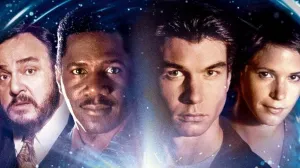Great sci-fi films have a way of instantly immersing you in their worlds. They might use striking atmospheric imagery to set the stage, or start with a killing to convey high stakes right off the bat. Regardless of the director at the helm or the specific techniques they use, the best sci-fi openings usually use every frame of the first sequence to transport viewers into a new time and place.
Videos by ComicBook.com
While hundreds of sci-fi films have caught audiences’ attention over the years, only a few opening scenes have been etched permanently into the cultural lexicon. These sequences, which span from the dawn of humanity, to dystopian Los Angeles, to a galaxy far, far away, have transcended their respective films, influencing generations of filmmakers. Many have even been referenced or parodied to the point that they are recognizable even to those who haven’t seen the movies.
7) The Fifth Element
Luc Besson’s The Fifth Element wastes no time setting up its bizarre archaeological mystery. In 1914, Egypt, a dusty temple wall hides the secret to saving humanity when an elderly professor (John Bennett) and his young assistant (Luke Perry) uncover hieroglyphs foretelling the apocalypse. “Aziz! Light!” the professor shouts, as gold beams illuminate the carvings. We’re on the edge of our seats already when the scene is interrupted by the arrival of towering alien beings, otherwise known as the Mondoshawans.
Éric Serra’s iconic score provides the perfect walkout for the Mondoshawans as they seal away humanity’s ultimate weapon: the Fifth Element. It’s somehow both pulpy fun and genuinely impressive. The practical alien character design, which used a mix of animatronics and manned suits, still works today. The sequence itself primes us to enter Besson’s wild world, sets up the ancient prophecy, and teases the epic adventure to come.
6) Children of Men
Not many openings across the science fiction genre have been able to achieve the realism of Alfonso Cuarón’s Children of Men. In London 2027, humanity has been infertile for 18 years, and the youngest person alive has just died. Clive Owen’s Theo stumbles into a coffee shop, watching the grim news report with other patrons, until an explosion tears the café apart moments after he leaves. The camera, in a handheld, unbroken shot, captures blowing dust and screaming chaos in real time.
The iconic tracking shot is a stunning entrance into the movie and has gone on to define Cuarón’s filmmaking style. The sequence as a whole helped earn Children of Men Academy Award nominations for cinematography, editing, and screenplay. The film’s first bleak moments plunge us directly into its gritty dystopia in under two minutes.
5) The Matrix
The Wachowskis’ The Matrix comes in with green lines of code that give way to cops searching an abandoned building. Enter Trinity, played by Carrie-Anne Moss, whose attempted capture prompts a slick, sickly-green chase scene. The sequence is a rundown of all things Matrix, complete with a black leather getup, slow-motion fight choreography, a call with Morpheus, physics-defying jumps, and an eventual escape through a ringing payphone. Don Davis’s score and Bill Pope’s camera work together give the scene a kinetic energy that hooks us immediately.
Within the first five minutes, The Matrix makes it clear this isn’t your average sci-fi fare, and the rest of the film delivers on that promise. The movie would go on to redefine science-fiction aesthetics with its digital action spawning Matrix sequels, spin-offs, and video games. Reviewers hailed it as an instant classic, praising the Wachowskis’ anime-inspired visuals, and even decades later, the rooftop chase remains a fantastic distillation of The Matrix’s appeal.
4) Blade Runner 2049 (and the original Blade Runner)
Denis Villeneuve’s Blade Runner 2049 opening masterfully drops us right back into Ridley Scott’s 1982 original. The first shot features a replicant eye echoed in subsequent shots that depict the bleak urban sprawl of the future. As Ryan Gosling’s Officer K arrives at a remote protein farm, we get thunderous sound design, minimalist dialogue (now signatures of Villeneuve), and Roger Deakins’ breathtaking cinematography. Within minutes, K kills a rogue replicant played by Dave Bautista, and the tone is set.
For many fans, the original Blade Runner opening was their first taste of cyberpunk. According to critics, Villeneuve took Scott’s vision and built upon it, perfecting the mood and paying homage to the original with a deep understanding of Scott’s filmmaking language. As a result, the 2049 opening is full of masterful technique and subconscious clues that help evoke the loneliness of existence in a synthetic age within the film’s first several minutes.
3) Jurassic Park
The opening of Steven Spielberg’s Jurassic Park features warden Robert Muldoon, played by Bob Peck, and a team of workers as they attempt to transfer a Velociraptor, later revealed to be the “Big One,” into her holding pen. The sequence unfolds at night, so visibility is low, and when gatekeeper Jophery Brown climbs on top of the crate to lift the gate, the raptor charges, dragging Jophery into its grasp. Muldoon desperately holds onto him, screaming, “Shoot her!” as the raptor mauls Jophery’s legs and pulls him away.
Needless to say, this opening lays out the central conflict pretty clearly, and it scares without showing too much. Upon its 1993 release, critics praised how Jurassic Park managed to build tension within minutes. The scene’s sound design does a lot of the heavy lifting with hissing, shouting, and the hum of the electric fence, using only a few quick shots of the dinosaur itself. Not to show us more of the monster is a stroke of genius, and we are immediately aware that bringing the prehistoric creatures back was a catastrophic mistake.
2) Star Wars: A New Hope
The first Star Wars film opens with a now-legendary title crawl that catches the audience up on the events leading up to the film. When the camera pans down, we get one of the most famous images in sci-fi movie history: a tiny Rebel ship pursued by a massive Star Destroyer. John Williams’ iconic score drums up excitement as laser fire rips through space, instantly establishing the David-and-Goliath struggle that is about to unfold.
When A New Hope debuted, no one had seen anything like it. George Lucas used miniatures and motion control to birth what would later become modern blockbuster filmmaking. The opening does a great job of conveying the scope and cinematic spectacle of the film itself, and it’s now been parodied in everything from Spaceballs to Family Guy. More than four decades later, that first pursuit is still effective enough to make audiences giddy and lay out the impossibility of the challenge to come.
1) 2001: A Space Odyssey
When it comes to iconic sci-fi openings, 2001: A Space Odyssey takes the cake. Stanley Kubrick subverts expectations by beginning the film not in space as the title suggests, but on Earth, during the “Dawn of Man.” In the sequence, prehistoric hominins struggle for survival until the mysterious arrival of the monolith, after which one ape decides to use a bone as a weapon. Kubrick follows the bone twirling through the air with a shot of an orbiting spaceship, and in one edit, millions of years of evolution flash by. When Richard Strauss’ “Also sprach Zarathustra” blares, you know you’re in for something great.
Audiences were stunned in 1968, and even now, the sequence remains one of the best sci-fi openings of all time. Perhaps more than any other intro on this list, “Dawn of Man” has been referenced in tons of other media, including The Simpsons, Mad Men, Monty Python, Attack on Titan, and even iconic films like Martin Scorsese’s Gangs of New York and Greta Gerwig’s Barbie. It prefaces the cosmic odyssey by telling us outright what the thematic implication is: that violence itself is paramount to human evolution. The first scene in 2001: A Space Odyssey is visually stunning, narratively rich, and remains a sci-fi opening in a class of its own.
Any iconic opening scenes we forgot? Leave a comment below and join the conversation now in the ComicBook Forum!









